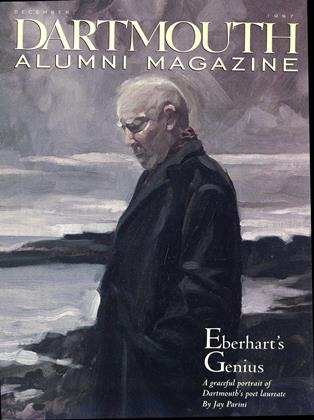This year's Convocation was the most intense in many years. It wasn't just that President James O. Freedman dedicated the coming academic year to John Kemeny '2 2A, who ushered in coeducation 2 5 years ago. Or that the Rev. Gwen King paid tribute to women who died before the world was ready to let them go: Betty Shabazz, Princess Diana, Mother Theresa, Dartmouth chemistry professor Karen Wetterhahn. Mostly the intensity came from the featured speaker, the writer Louise Erdrich '76.
"In the months since my husband, Michael Dorris, a vibrant member of the Dartmouth community, took his own life, I thought, of course, about canceling this engagement and retreating completely from public life. But I knew that if I did, I would lose a very powerful chance to address those of you—and that includes all of you—whose lives will include some setbacks and shocks and failures. I would lose the chance to address you human to human, as if there were no age and no difference between us, and as if this podium wasn't here, lovely though it is. I would lose the chance to address you as someone who entered Dartmouth more scared than any of you who are freshmen now, I'm sure. More nervous, more confused, more filled with irrational self-confidence yet no self-esteem whatsoever."
Having related tales of her own failures at Dartmouth, especially in a mandatory math class, Erdrich told the students, "You'll hit walls here. I know I did. Part of growing into your intellectual life and your emotional life is knowing that sometimes you won't clear them. The stress of trying can deplete you sometimes to the point of exhaustion.
"I know I probaby don't need to say this, but I have to," Erdrich continued, speaking friend to friend. "Treat any signs of depression that you have as though you've got a dangerous virus. With an open heart, seek help and you'll find it here. Talk to your friends, because depression is an illness that feeds on isolation. I can tell you that no one who has loved someone, no loved one of a suicide, will ever be intact again. We are left holding the curve of a question mark above the dark period of that decision. And yet it's possible, I hope, and by being here today I'm trying to realize that hope, to hold that question in the open as an archway for others to safely pass beneath."
Erdrich closed her address by turning to her native language, Ojibwa, which, she said, Michael Dorris helped her appreciate. "This College has prepared a road for you. As you walk this road, you will understand that the beauty of this road lies partly in its difficulty, just as the most scenic roads traverse the roughest terrain. Don't forget, you walk in others' tracks and leave tracks as well. Make them straight. Keep your path true, for these tracks will forever show the character of your passage."
Louise Erdrichdelivered themost movingConvocationspeech inmemory.
 View Full Issue
View Full Issue
More From This Issue
-
 Feature
FeatureEarly X-rays, Missing Skulls and Frozen Pizza
December 1997 -
 Cover Story
Cover StoryThe Full Mind of Richard Eberhart
December 1997 By Jay Parini -
 Feature
FeatureNathan's Body Shop
December 1997 -
 Feature
FeatureCathedral in THE PINES
December 1997 By Castle Freeman Jr. -
 Feature
FeatureA Musical Post-Mortem
December 1997 -
 Feature
FeatureAn Uulikely Medical School
December 1997







